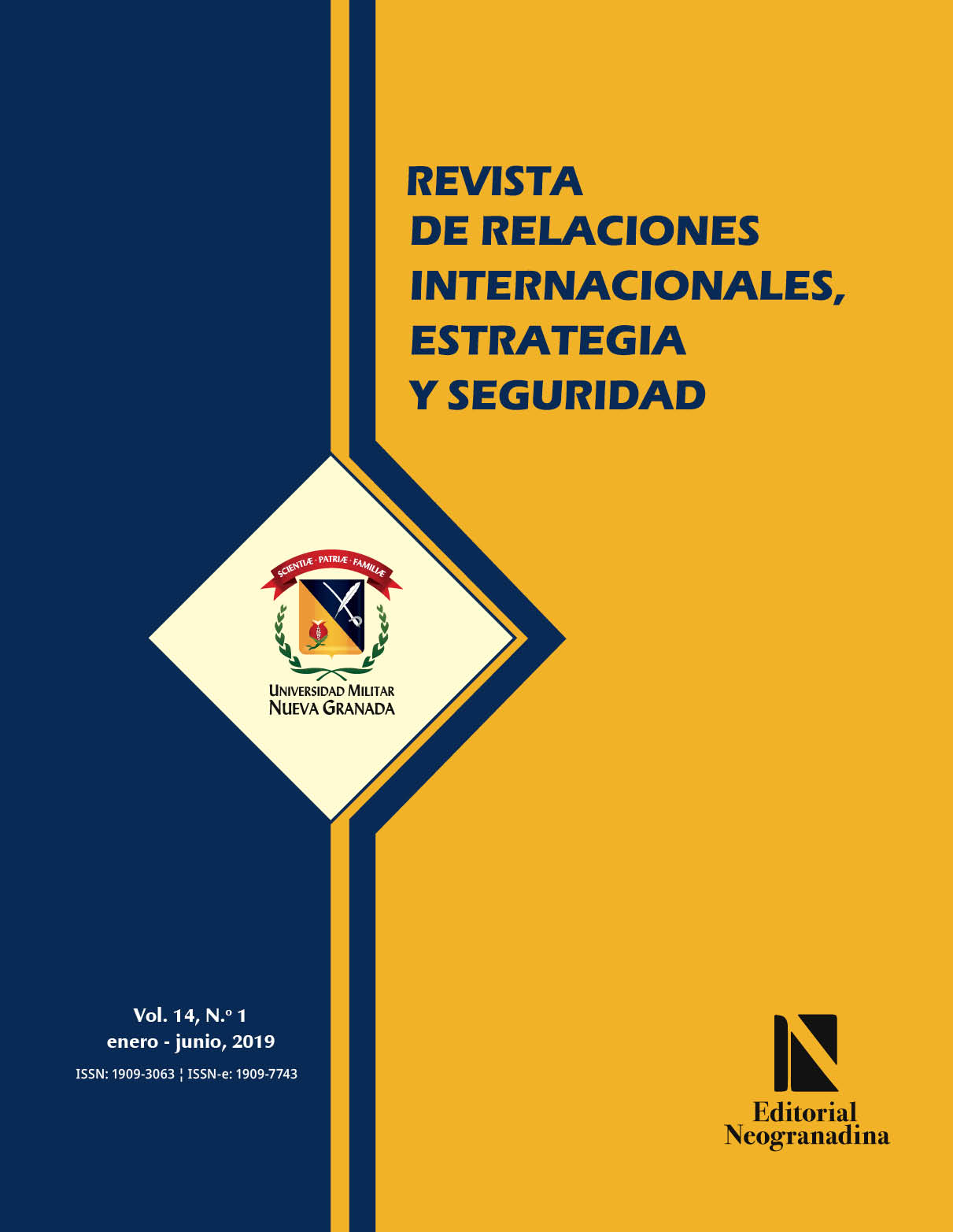Divergências e imprecisões no conceito “terrorismo”: questionamentos para as abordagens teóricas tradicionais
Resumo
O presente trabalho postula que as supostas indefinições conceituais de terrorismo, que dão lugar a uma série de imprecisões que dificultam a compreensão dele por parte dos estudiosos, devem ser relidas, porque, na realidade, são os mesmos autores que estabeleceram os elementos mínimos para entender esse fenômeno. Para eles, o terrorismo se manifesta em ataques violentos e deliberados contra civis, perpetrados por pequenos grupos e com importantes efeitos públicos e psicológicos. Em outras palavras, um bom número de especialistas defende que trata-se de um termo sem definições claras, porém, conseguiram estabelecer o que ele é na prática. A fim de comprovar esta hipótese, alguns dos trabalhos mais reconhecidos e citados por membros da comunidade acadêmica que são especialistas em terrorismo serão estudados e contrastados.
Downloads
Referências
Acosta, B. (2014) "Live to Win Another Day: Why Many Militant Organizations Survive yet Few Succeed", en Studies in Conflict and Terrorism, vol. 37, N° 2, Estados Unidos. https://doi.org/10.1080/1057610X.2014.862900
Alexander, Y. (1992) International Terrorism: political and legal documents, Martinus Nijhoff Publishers, Estados Unidos.
Aron, R. (1962) Paix et guerre entre las nacions, Calmann Levi, Francia.
Barker, J. (2003) El sinsentido del terrorismo, Intermón Oxfam, Inglaterra.
Carr, C. (2002) The lessons of terror: a history of warfare against civilians, Reprint Edition, Estados Unidos.
Casaca, P. et. al. (2017) Terrorism Revisited: Islamism, Political Violence and State-Sponsorship, Springer, Bélgica.
Clutterbuck, R. (1977) Guerrillas and terrorism, Faber and Faber, Inglaterra.
Combs, C. (2016) Terrorism in the Twenty-first Century, Routledge, Estados Unidos.
Cooper, H. (2001) "Terrorism: the problem of definition revisited", en American Behavioral Scientist, N° 44, Estados Unidos. https://doi.org/10.1177/00027640121956575
Crenshaw, M. (1981) "The Causes of Terrorism", en Comparative Politics, vol. 13, No. 4, CUNY, Estados Unidos. https://doi.org/10.2307/421717
Crenshaw, M. (2000) "The Psychology of Terrorism: an agenda for the 21st Century", en Political Psychology, vol. 21, No. 2, Society of Political Psychology, Estados Unidos. https://doi.org/10.1111/0162-895X.00195
English, R. (2010) Terrorism: how to respond, Oxford University Press, Estados Unidos.
Englund, S., Stohl, M. (2016) "Constructions of terrorism", en Perspectives on terrorism, vol. 10, N° 3, Leiden, Holanda.
Ganor, B. (2002) "Defining terrorism: is one man's terrorist another man's freedom fighter?", en Police Practice and Research, vol. 3, no. 4,The International Policy Institute for Counter-terrorism, Inglaterra https://doi.org/10.1080/1561426022000032060
Gerringer, A. (2002) Terrorism. From One Millenium to the Next, Writer Club Press, Estados Unidos.
González C., E. (2012) El laboratorio del miedo. Una historia general del terrorismo, Editorial Crítica, Espa-a.
Jenkins, B. (1985) International terrorism: the other World war, Rand Corporation, Estados Unidos.
Hoffman, Bruce, et al (1995) "The Rand-St. Andrews chronology of International terrorism", en Terrorism and political violence, N° 7, St. Andrews University, Escocia.
Hoffman, B. (2006) Inside terrorism, Columbia University Press, Estados Unidos.
Izquierdo, C. (2017) "La Unión Europea contra la financiación del terrorismo", en Opinión, N° 65, IEEE, Espa-a.
Laqueur, W. (2012) A history of terrorism, Transaction Publisher, Estados Unidos.
Law, R. (2013) Terrorism: a history, Polity Press, Inglaterra.
Lizardo, O. (2008) "Defining and theorizing terrorism: a global actor-centered approach", en Journal of World-Systems Research, vol. XIV, N° 2, Estados Unidos. https://doi.org/10.5195/JWSR.2008.341
Lutz, J., Lutz, B. (2017) "The Ambiguous Effect of Population Size on the Prevalenceof Terrorism", en Perspective on Terrorism, Vol. 11, N° 2, Leiden, Holanda.
Mahan, S. et. al. (2013) Terrorism in perspective, Sage Publications, Estados Unidos.
Mahncke, D. Monar J. (2006) International terrorism. A European Response, College of Europe Studies, Bélgica.
Moghadam, A. (2006) The roots of terrorism, Chelsea House, Estados Unidos.
Municio, N. (2017) "Evolución del perfil del yihadista en Europa", en Opinión, N° 51, IEEE, Espa-a.
Page Fortna, V. (2015) "Do Terrorists Win? Rebels' Use of Terrorism and Civil War Outcomes", en International Organization, Vol. 69, Cambridge University Press, Estados Unidos.
Parry, A. (2013) Terrorism: from Robespierre to the weather underground, Dover Publications, Estados Unidos.
Remón, J. (2006) "Aproximación a la historia del terrorismo", en Portolés, M. Afrontar el terrorismo, Fundación Seminario para la Investigación para la Paz, Espa-a.
Rivas Nieto, P. (2012) Terrorismo y antiterrorismo en el mundo contemporáneo, Random House Mondadori, Bogotá.
Rivas Nieto, P. Plaza, J. (2015) "El régimen informativo del terrorismo. Propuesta de un modelo hermenéutico", en Palabra Clave, vol. 18, núm. 2, Universidad de La Sabana, Colombia.
Ross, J. and Gurr, T. (1989) "Why Terrorism Subsides: A Comparative Study of Canada and the United States", en Comparative Politics, Vol. 21, No. 4, CUNY, Estados Unidos. https://doi.org/10.2307/422005
Ross, J. (2007) Political terrorism. An interdisciplinary approach, Peter Lang Publishing, Estados Unidos.
Sageman, M. (2008) Leaderless Jihad: Terror Networks in the Twenty-First Century, U. of Pennsylvania Press, Estados Unidos. https://doi.org/10.9783/9780812206784
Sánchez, E. (2016) "Las nuevas "viejas guerras" entre el terrorismo y la insurgencia", en Análisis, N° 76, IEEE, Espa-a.
Santifort, Ch. et. al. (2012) Terrorist attack and target diversity: Changepoints and their drivers, School of Economic, Political & Policy Sciences, University of Texas at Dallas, Estados Unidos.
Schmid, A. y Jongman, A. (1983) Political Terrorism: A New Guide to actors, authors, concepts, data bases, theories and literature, North-Holland Publishing Co., Estados Unidos.
Sederberg, P. (1991) Terrorism: contending themes in contemporary research, Garland, Estados Unidos.
Smelser, N. (2010) The faces of terrorism: social and psychological dimensions, Princeton University Press, Estados Unidos.
Tigar, M. (2007) Thinking about terrorism. The threat to civil liberties in times of national emergency, ABA Publishing, Estados Unidos.
Wardlaw, G. (1982) Polítical terrorism: theory, tactics and counter-measures, Cambridge University Press, Estados Unidos.
Weiviorka, M. (2007) "Terrorism in context of academic research", en Crenshaw, M. Terrorism in context, Pennsylvania University Press, Estados Unidos.
White, J. (2016) Terrorism and Homeland Security, Cengage, Estados Unidos.
Wright, A. (2013) Terrorism, Ideology and Target Selection, Working Paper, Department of Politics, Princeton University, Estados Unidos.
Zulaika, J. et. al. (2016) Terror and taboo: the follies, fables and faces of terrorism, Routledge, Estados Unidos.












